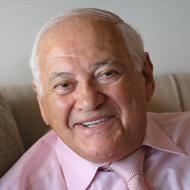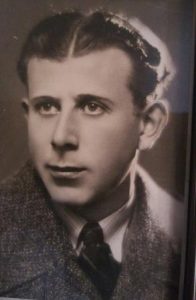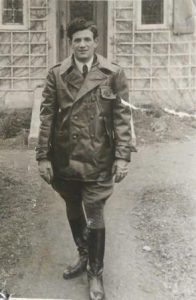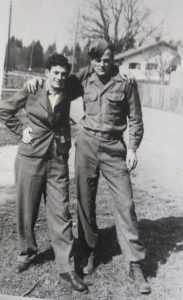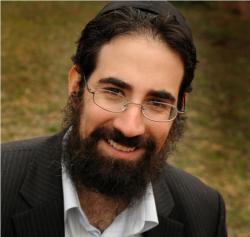I. Why this Campaign?
I recently went to a lecture at the local Jewish Federation by Jack Repp, advertised as a Holocaust survivor’s testimony. I have heard many testimonies and expected to hear a similar experience, parts that were unbearable to listen to and others that were inspirational. But this one caught me by surprise—his character, the fearlessness and ingenuity in the most difficult circumstances.
After the lecture, I went up to Jack and began asking him about the specific work he did for the United States Secret Service, hunting Nazis after the war and bringing them to trial. More specifically, I wanted to know why he—of all the men available—was selected, a 21-year-old survivor who had just recovered in a hospital. I asked him a few more questions about his life, and at some point in our conversation he said, “You know, during all my lectures, I only tell a fraction of what I really witnessed.”
I inquired whether he’d ever considered writing his story in a book. He said people had mentioned the idea to him over the years, but the timing and opportunity were never right. I told him that I was a rabbi and a writer and asked if he’d be interested in working together on his memoir. He replied, “Let’s do it!”
After meeting with him privately a few times, I have made it my short-term mission to preserve this historical account and put Jack’s unique story down on paper. Jack is now 93 years old, but his memory is still sharp. He is willing to put in the necessary hours to relate the details of his experiences and answer all my questions. There are many things he tells me during these private interviews that he has never shared in any lectures or video testimonials. And there is so many important UNTOLD STORIES he can still share.
I’ve spent the past several months devoting my time and resources, trying to gain the funding that will allow me to write his complete story. But the traditional avenues—from institutions and individuals who expressed enthusiasm—have fallen short. At this point, the clock is ticking for me to begin and finish this meaningful memoir.
II. What’s Different about This Memoir?
This is not just another holocaust testimony describing the horrors of the war. It’s a unique story about a young man who persevered through the worst circumstances and who, just four months after surviving the atrocities among his people, recuperated and immediately risked his life to dress up as a German and help the Secret Service bring Nazis to trial. During this period, he encountered a variety of personalities: he worked with Generals Eisenhower and Patton (he even has a gift from General Patton’s grandson in gratitude). He also used his connections to help Menachem Begin in Germany while he was preparing to fight in Israel.
In America, Jack started from scratch and opened a dry goods store in South Dallas, Texas. When all the Jews moved their businesses (because they felt the area was unsafe), Jack stayed. He helped the local African American community and built a lasting relationship.
Jack Repp is not only a survivor of the war—he is a survivor of life. I believe his story can reach a diverse audience, impart plenty of lessons, and inspire people. It’s a message of hope for humanity, about not holding hate in your heart and treating every person with dignity.
III. Style
The story will be told in the first person, using Jack’s voice and way of speaking—honest and direct—and succinctly capturing the relevant details and the life lessons he learned.
IV. What the Funding Will Cover
My goal is to meet with Jack weekly, record our conversations, and produce an inspirational memoir in 3 months for him to distribute at lectures. (He is still active, traveling to speak to different groups in Dallas and surrounding areas, and giving all proceeds from his lectures to the local Holocaust museum. )
This campaign aims only to cover my expenses: many intensive hours of interviewing, transcribing, reworking and organizing and polishing the narrative, as well as the final editing, proofreading and fact checking services, plus design and printing costs .
V. A Chance to Support an Important Cause
The window is closing. There are few remaining survivors, and even fewer have the memory, the time, patience and energy that Jack does—not to mention the unbelievable story to share with the world.
Over the last ten years, Jack has received thousands of letters— from people of all faiths and backgrounds—thanking him for sharing his experience and message and relating how his one hour lecture has changed their life. Imagine the impact of a well-crafted memoir!
With your help, we can make this happen in a short time and also benefit the next generation.
If you would like to know more about this poignant and remarkable story, below are some rough highlights I gathered from our conversations (and there is plenty more to record):
——————————–
Overview
Jack Repp was born Itzick Zgeprevitch in Radam, Poland. His father was a wealthy businessman, a moneylender and store owner who often mentored Jack in his business dealings. Jack has many still-fresh and fond memories of his early life in Poland, life in his parents’ house with his three brothers and older sister, cousins and grandparents who often came to the house to visit. Not a day goes by where he doesn’t mention something about his parents.
As a young boy at the age of 3, his mother used to wake him and say the Modeh Ani (the Hebrew prayer of gratitude for restoring one’s soul each day), then she’d hold a bowl by his bed and wash his hands. He went to an interfaith school but remained active in Jewish life. He recalls the grand synagogue, a beautiful building with high ceilings and elegant chandeliers, where the community gathered on Friday night, dressed in their finest clothes. There was also the nearby beit midrash (house of study), where local Jews, mainly the poor and simple folk, gathered to study and pray on weekdays. On Fridays, his father brought home many guests, including the rabbi of the shul, the cantor, and the gabbai (the person who assists in the running of synagogue services . ) The group of men stayed together at the table long into the night singing Sabbath hymns.
“We had a good life,” Jack recalls. Then everything changed. The Nazi’s started rounding up Jews and put them in ghettos. Sadly, at the age of 15, Jack came home to an empty house. He would never see his parents again.
It began one day in early autumn, as Jack was walking in the center of town wearing slacks and a nice sport coat, a band around his arm with a yellow star of David. He noticed the officers gathering Jews, so he quickly tore off the band and ran to hide in the nearby church. On his way, he saw a young Jewish mother nursing her baby and crying. The tears continued to flow as she changed her infant’s clothes, wrapping a cloth diaper twice around the child’s bottom, then bundled the baby in a thick blanket. He peered around the corner, waiting to see what would happen next. The mother kissed her child and placed it in a nearby apartment stairwell, then turned and walked away in the hope that some righteous non-Jew would find her baby and take it in.
Jack ran into the church building and into an empty sanctuary, crouching behind a statue of the Virgin Mary so nobody could see him. There was only one nun present in the building at the time—but she didn’t appear to notice him. So when two SS soldiers came storming in with their German shepherds, leather whips, and guns, asking the nun, “Are any Jews around here?” she replied that she was there alone. Amazingly, the soldiers left without looking or letting their dogs sniff around.
As Jack stood up from behind the statue, the nun saw him and gasped in shock. She immediately started praying to the statue, asking for forgiveness for telling a lie.
Overhearing her prayer, Jack asked her if she knew that he had been hiding there.
“Of course not,” she replied, “otherwise I would have told them you were there.”
“Well then, I would have told them you hid me,” Jack retorted, “and they would have taken you with me.”
Before the war, Jack’s older sister had moved to Paris with her husband. She would send the family letters and gifts on milestones, such as for Jack’s bar mitzvah. His older brother, Sruel, had attended university in Germany, and then moved back home, where Jack’s father opened a store for him to run, selling women’s coats.
The Repp family had a Polish non-Jewish neighbor whose daughter, Mary, had attended the same university as Sruel. One day, her father approached Jack’s father with a proposition: “We both see what’s happening to the Jews,” he said. “I can arrange false Aryan papers. Let Sruli and Mary move to Warsaw, pretend to be married, and bring along your son Yankle to pose as their child.” So the three of them—Sruel, Mary, and Yankle—moved to Warsaw.
Sruel before the war
Sruel was friends with Mordechai Anielewicz, leader of the Jewish combat organization, and during the Warsaw ghetto uprising, against the wishes of Mary, 20-year-old Sruel began smuggling weapons to the Jews in the ghetto. Yankle (who was then 7) used to carry the weapons through the sewer. They were both eventually caught and murdered.
Slave Labor Camps
When Jack was taken by the Nazis, he was 15. But when asked about his age, he told them he was 18. He knew that if he said he was only 15, he’d be killed. So he boldly declared that he was 18—he looked strong and athletic. He was sent to a labor camp in Radam.
Then Jews began arriving from other countries—from Austria, France, and Holland. “They were more educated and sophisticated than the Polish Jews,” Jack recalls. “I was one of the young men who helped people with their belongings coming off the train. I remember helping an aristocratic Jewish lady. Dressed stylishly with a fur coat and jewelry, she steps off the train, looks around as she lights up a long cigarette and reaches into her purse to tip the helpers. A few hours later, she’s a different person—her belongings seized, her head shaved, she now stands in stripped prisoner’s clothes. A few days later, she’s a body being thrown to the crematorium. That’s what life was like for us. Like a horror show: ‘Now you see me; now you don’t.’”
His many stories of the camps are accounts of unfathomable evil, sadistic methods of torture, starving, and methods of killing people efficiently in order to save bullets. Through a series of remarkable miracles and resourcefulness—getting to know the right people and finding ways to get food—Jack managed to escape death many times. He worked in an ammunition factory putting together machine guns. He also smuggled parts outside the camp through an officer, a Polish partisan posing as a Nazi, whom Jack had befriended in the camp. He later worked in stone mines.
Six years later, on a death march in the bitter cold, wearing shoes with plastic tops held together with wire, and hard wooden soles that slid off whenever he stepped in moisture, Jack encountered the infamous “angel of death”—Joseph Mengele. Mengele had Jack’s hands and feet tied, then called out a teenager from the line, handed him a pair of rusty pliers, and ordered him to pull out all of Jack’s teeth to get to a tiny gold filling at the back of his mouth. Every tooth was pulled out, and some of his gums along with it. Jack marched on, his mouth dripping with blood, which froze on his face. With nothing to rinse his mouth, and needing to continue, he had no option but to use his own urine.
Unable to stand for a final roll call, Jack lay ten feet away from the crematorium when he heard a voice speaking Yiddish: “Don’t be scared. You are free! You are free.” He opened his eyes and looked up. He saw two shining gold stripes on a shoulder of a Jewish American soldier. Jack then weighed 69 pounds.
Freedom
Jack was sent to a Red Cross hospital, where he slowly recovered. He was grateful just to have a bed to sleep in, rather than lying on a shelf, the freezing cold ground, or on top of a dead body to keep warm. One day, he stood up from bed and walked to the restroom, where he saw something he hadn’t seen in six years—himself. He gazed at his reflection in the mirror, asking, “Where should I go now?” He had no family, no friends, and no home. Then he heard a whisper that told him to go back to the camp. He went back to Dachau, where he found the same American officer. “Go home,” the soldier told him. Jack sat down on the grass and began to cry. “I have no home,” he said.
The officer handed him a bar of Hershey chocolate and a piece of gum, which Jack put in his pocket. Jack asked him if he could find him some work, so the officer arranged a job for him in the kitchen of the building where the American officers were stationed. He worked during the day and continued to sleep at the hospital.
The first day of work, while peeling the potatoes, Jack couldn’t bear to throw away the peels—a dirty peel would have been a meal in the camps—so he collected all the peels inside his shirt. When his supervisors discovered the shirt stuffed with waste, they took him up to the office, reprimanded him, and made him promise he would not steal. “Just peel the potatoes and throw away the peels like we told you. If we catch you stealing,” they warned, “you’ll be fired.”
The next day at work, Jack noticed the most beautiful packages of pastries on the table across the room. He couldn’t resist. He quickly walked over to the table, looked around, then took one package and hid under the table. He unwrapped the pastry and gobbled the entire thing. As he put the last piece in his mouth, two men walked in—he was caught.
They brought him up to the office and told him he was fired. He began to cry. “You can cry all you want,” they said, “but we’re not gonna budge until you tell us why you are doing this.” Jack then discovered that it was, in fact, a loaf of white bread—he had never seen white bread in Poland. He began to explain: “All my time in the camps, I had a dream. My dream was that if I ever made it out of here, and if I could ever have one loaf of bread, I’d finish every last piece. That was my fantasy!” The men began to cry with him, hugged him, and promised to help him.
United States Secret Service
One day in the hospital, Jack woke up to two men standing over his bed. They were in their thirties, impeccably dressed in suits, and they asked Jack what languages he spoke. He told them he spoke Russian, German, Polish, Yiddish, Czech, and Yugoslav. “You speak German?” they asked. At first Jack thought they were from the Gestapo. “No, we’re Americans,” they said. They then inquired whether he would like to work for the United States Secret Service.
“Doing what?” Jack asked.
“Hunting Nazis.”
They brought him to their headquarters, where he was introduced to the superior. For three months, they gave him a crash course in English. They also gave him dental work to replace all the teeth he had lost. Just a short time after surviving the camp, Jack was still frail, but he was not fearful. He began working for the United States Secret Service. His job was to mingle amongst Germans and pose as a Nazi trying to find ways to flee the country. He would inquire about the best hiding places and get information of the whereabouts of other Nazi soldiers. It was a dangerous job, and if anything went wrong, he could have easily lost his life. Jack helped the Secret Service track down many Nazis and bring them to the tribunal. He was present at the trials and at the hangings.
“The Americans treated me like a brother,” Jack recalls. “I had my own chauffeur. I ate in the same place as the agents, slept where they slept. Here I was, a young boy who had just survived the worst atrocities, yet was willing to put my life on the line to help them. They respected me for that.”
Though the U.S. Secret Service offered, Jack never accepted money—he felt like it was his mission and that it wouldn’t be right to take money; instead they gave him rations in cigarettes, which he collected and sold on the black market. He also knew General Eisenhower and worked with General Patton closely.
During this time period, someone told him about a Yiddish play, The Dybbuk, at the displaced persons center. Jack went to the play, dressed in his officer’s uniform. As he looked for an empty seat, a young lady around 17 years old named Esther asked if she could take his coat. She then gave up her seat for him. She held his coat for the entire show, and when it was finished, he thanked her. He noticed that her clothes were made out of bedsheets. The next day, Jack sold cigarettes and bought some fabrics, which he took to a tailor to make into dresses and undergarments. For the next few weeks, Jack visited Esther. He brought her new clothes and fresh fruit. They talked about their experiences in the war. She was the daughter of a prominent Polish family. Esther and Jack would later marry in Germany, with all the Secret Service men attending the wedding.
Jack in his army uniform Jack with his chauffeur
Around the same time, one of the officers asked Jack if he wanted to come along to Paris. Jack suddenly remembered the address on a letter that his older sister had written to him before the war—34 Rue LaMartine. While in Paris, he went to visit the address. He asked the concierge if the family still lived there. The husband had been taken to Auschwitz, she said, but Madame was still alive. He was then brought to a nunnery, where his older sister had been hiding. She came out wearing a nun-‘s habit and church clothes but she didn’t recognize Jack. He was only a boy when she left, and she hadn’t seen him in years. Furthermore, he was dressed in an American uniform.
Jack decided not to tell her who he was right away, lest she have a heart attack. So he told her he was a Jew from Greenville, Texas, where the Repp family had relatives. The two of them sat and spoke for hours before Jack revealed that he was her little brother. They sobbed and reminisced about their lost family. She then took him to a Catholic orphanage, where she brought out her 8-year-old daughter, Malka.
Rebuilding in America
Jack and Esther, along with their baby girl, took a ship and arrived in Dallas, Texas, where Jack had wealthy cousins who offered him a job. While obtaining their papers for the trip at the American embassy, Jack saw a Jewish man, Chil, whom he knew from the camps. This man, from a good family, had cooperated with the Nazis and worked as a officer, walking around with a whip and hitting prisoners, sometimes just for fun.
“Where are you going, Chil?” Jack called out. He walked over to him.
“I’m moving to Australia,” he answered.
Jack stared into his eyes. “You remember what you did?” asked Jack. The man began to tremble, trying to befriend him. At that point, Jack said to himself, Let him be punished by someone else’s hand—not mine. He walked away.
After arriving in America, Jack taught himself to read English from the street signs. When he arrived in Hillsborough, Texas, where his uncle had a store, he managed to find a hotel nearby that would charge him only a dollar a day. The room was so hot—even at night—that Jack used to sleep in the bathtub full of water.
After a few odd jobs, Jack went to work for his family in Dallas at Zales Jewelry. The first day the manager handed him a rag and some Windex to clean the showcases. “I don’t do that kind of work,” Jack said. The manager angrily called Jack’s uncle to complain, but was instructed to have pity on Jack and let him be, since he had just survived the war. Then one day, while the salespeople and manager were trying to sell an engagement ring to a young couple, Jack stood nearby watching as they showed the couple case after case of diamonds but failed to make the sale.
When nobody was paying attention, Jack took one of the cases off the table and brought it to the back room. He polished the diamonds, something he knew how to do well. He then walked back with the same suitcase and said to the couple, “My name is Jack; I just returned from Europe. Would you like to see some European diamonds?” They nodded. He opened up the case, and the customers’ eyes immediately lit up—he made the sale.
After his uncle heard the story, he wanted to appoint Jack as manager, but Jack refused to take the other man’s job. He wanted to work for himself.
Like his father, Jack was a wise businessman, and he quickly managed to open up his own dry goods store in South Dallas. It was not a safe area, and other owners had lost their lives after reporting customers who were trying to shoplift, who then returned and shot them the next day. When the rest of the Jews left that part of town, he stayed. Jack operated differently. He hired an African American manager and gave him a gun, and if Jack caught someone stealing, he never attempted to have them arrested. “You must have forgotten to take off those pants you have underneath,” he’d say to a customer trying to steal, “but don’t worry, just keep them on.” He treated everyone politely and with dignity, a trait he learned from his parents. As a result, the next time they came in, they would approach him and say, “Don’t worry, Mr. Jack. I ain’t gonna steal nothing from you this time.”
Jack hired many local high school teenagers, whom he fed and was generous with. He often brought home children, who slept next to his own children. In short, he quickly built a relationship with the African American community—to the point that people on the street used to run to open the door for his wife when the car pulled up. During the riots, the Black Panthers stood outside his store to protect it. “This is our store,” they said.
He grew his business from a dry goods store to a department store, gave his family the best life…
[The above is a glimpse of some stories I have recorded.]

